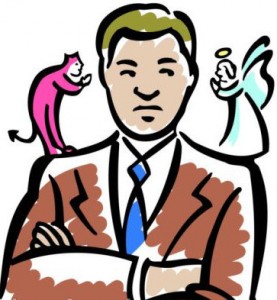I don't know if this counts, but perhaps Pack hunter will set us on the trail?
Elephants, horses, gorillas and chimpanzees are also pack-social (not herd-social) and they are grazers.
Major differences:
- A herd has one leader, usually a female. A pack usually has a hierarchy.
- A herd leader usually has only one responsibility: to lead the herd to the next grazing area. A pack leader enforces discipline and usually has first rights (in some species exclusive rights) to the females in heat.
- Members of a herd are free to leave. This is almost unheard-of in a pack.
- Herd-mates don't establish close relationships; their responsibility to each other is typically only to avoid inadvertently harming each other and to protect all the young. They'll step right over a wounded comrade, hoping the lions will be too busy eating him to chase somebody else. Pack-mates form strong loyalties, defending each other from larger predators and even protecting a wounded comrade. A team of biologists were studying the African wild dog. They shot one with a tranquilizer and brought him into their hut. One of his pack-mates walked right in, grabbed him by the tail, and began dragging him back out to safety, knowing full well that these "predators" were immensely powerful. They were so touched that they let him get away with it.
The most commonly known pack hunter is the Gray Wolf, the ancestor of all breeds of domesticated dogs.
All modern dogs are descended from a small pack of gray wolves that lived in Mesopotamia at the time of the Agricultural Revolution, 12KYA. Since wolves are capable of surviving by scavenging and simply prefer hunting, it's likely that a few lazy, curious wolves were attracted to the middens (garbage piles) that sprang up around the herding-and-farming villages. The humans regarded their cleanup as a service, and soon discovered that having predators with excellent night vision around made their nights safer, so long as there was an understanding about not eating the baby humans. Soon the babies of both species began entertaining each other, making life easier for all the adults.
Although the Agricultural Revolution occurred independently in quite a few different regions, some in the Western Hemisphere, the self-domestication of the dog only occurred once. Travelers brought their dogs with them and traded them for goods and services, establishing satellite populations before the local wolves made the transition.
There is plenty of evidence of self-domestication of dogs happening in earlier eras, but for reasons we'll never know, none of those populations survived to add their DNA to the worldwide pack. I suspect that without the food surplus created by farming and animal husbandry (the twin technologies that comprise agriculture), life with humans wasn't as easy and enjoyable as it would be among farmers and herdsmen who slept in the same place every night.
Humans and their closest-living relatives chimpanzees are themselves pack hunters even without aid of other species.
And chimpanzees aren't even predators, although they'll eat meat if it's available. This puts the chimp in the class with horses and elephants: pack-social grazers. Gorillas live much the same way, although their packs are much smaller, almost always one alpha male with his female descendants and pre-pubescent male offspring who have to go form their own packs when they're ready to breed. Gorillas inbreed so heavily that the skulls of two individuals from packs 500 miles apart look like they're from different species.
Most pack hunters are found in the southern African savannas, with a notable absence in tropical rainforests and with the exception of the wolf and coyote, higher latitudes.
The wolf is the most successful land-based predatory mammal on the planet. With no help from humans it spread to all the continents except Australia and Antarctica. (The dingo is a partially evolved wolf-dog brought to Australia by Asian explorers during the late Neolithic Era. A snapshot of what dogs were like before the Bronze Age transformed civilization with metal farming tools, domesticated horses and the wheel.)
A shared pack hunting history is thought to be the main conduit through which humans have been able to form a mutual relationship with dogs (that is, domestication), as both species are highly social and inter-dependent.
This hypothesis will surely be tested and modified now that we've discovered that wolves only became domesticated
after humans settled into permanent agricultural villages and no longer depended on hunting for survival. As I noted above, it's easy to assume that the first dogs were simply
lazy and didn't want to spend their days chasing game when all they had to do was develop a taste for a diet with a much higher vegetable content.
This reduction in protein, as they switched from a hunter's to a scavenger's diet, required them to evolve smaller brains, the support of which necessitates an enormous amount of dietary protein.
Humans easily take over the dominance hierarchy of dogs as subordinates instinctively follow the “alpha” individual and dogs are accustomed to living very close together.
Aside from the brains and some barely noticeable change in the shape of their teeth, the major changes in the evolution of wolves
(Canis lupus lupus) into dogs
(Canis lupus familiaris) were in their psychological makeup. Dogs are much more gregarious than wolves, whose packs seldom contain more than ten individuals. They have a much weaker alpha instinct and will happily allow a member or
another species to be pack leader, so long as he drags home a dead cow twice a month. In general they socialize more happily with other species, including cats, monkeys, rodents, birds and livestock. They also exhibit
neoteny, the retention of immature traits into adulthood, including barking, tail-wagging, rough-housing and playing fetch. Adult wolves lose these behaviors, but dogs continue doing them until the day they die, which endears them to us and encourages us to let them join our packs.


